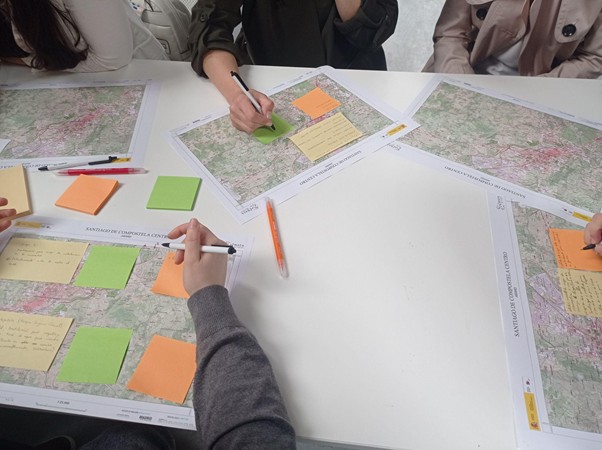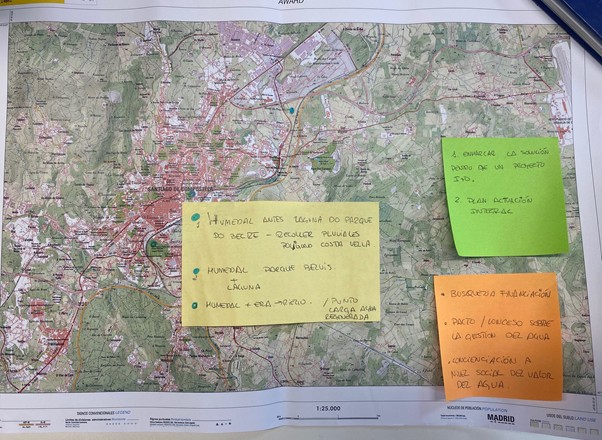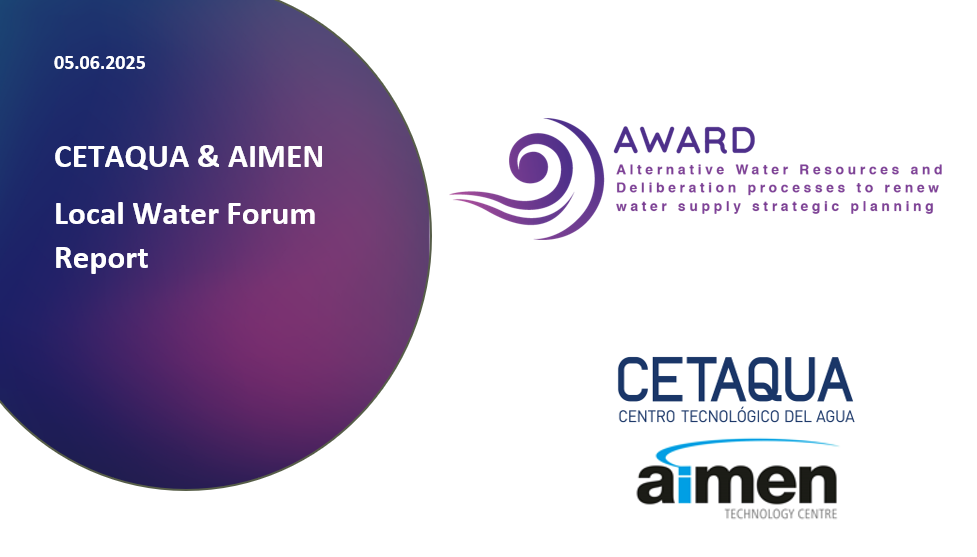Context
The Local Water Forum of #DC4 took place on June 5, 2025 — World Environment Day — in Santiago de Compostela. The event lasted two hours and brought together 13 participants from public administration, academia, the business community and the water sector.
The main objective of the Forum was to bring citizens and key stakeholders from economic, academic, and environmental sectors closer to the knowledge and relevance of Alternative Water Resources (AWR) in water scarcity contexts, as well as to foster social acceptance and involvement in initiatives related to sustainable water management. Furthermore, the event aimed to understand the participants’ willingness to engage in future editions of the Forum, with the goal of consolidating, in the medium and long term, a local community group committed to sustainable water management and active in proposing improvements for the city of Santiago de Compostela.
In summary, the Local Water Forum created a space for dialogue, awareness-raising, and engagement among diverse local profiles, encouraging collaboration and commitment towards building a more resilient city and laying the groundwork for future editions involving a wider range of territorial stakeholders.
Methodology
Presentation and contextualisation
The session began with a formal welcome by Cetaqua, which also included opening remarks from Xesús Domínguez, City Councillor for Environmental Sustainability, Animal Rights, Basic Community Services, Parks and Gardens, and Public Works, and from Nicolás Esmorís, Executive Director of Viaqua. Next, the event structure was presented, along with the objectives of the Local Water Forum. After this explanation, participants were asked to complete a brief survey to assess their initial level of knowledge regarding Alternative Water Resources (AWR), the water situation in Santiago de Compostela, and their attitudes and behaviours related to responsible water use. Participants were then invited to introduce themselves through a short ice-breaker in which they shared a personal experience related to water. Afterwards, the main content of the Forum was presented: Alternative Water Resources, the AWARD project and its demonstrators, and the project's digital twin as the platform where the contributions gathered during the event would be represented.
Group dynamic “Dreaming AWR in our territory”
Following the introduction and content presentation, the methodology of the Local Water Forum included a participatory activity titled “Dreaming AWR in our territory”, which aimed to gather citizen proposals, concerns, and opportunities related to the uses, organisation, and future vision of Alternative Water Resources (AWR) in Santiago de Compostela. For the activity, participants worked in pairs using printed maps of the city to identify possible uses and locations for AWR based on their individual experiences. The activity was structured around three thematic blocks, guided by the following key questions:
- What if we were able to replicate Alternative Water Resources? Which ones and where? To imagine and locate AWR in the territory without concern for technical feasibility, linking them to sectors, associations, or personal experiences.
- What knowledge can we contribute from our sectors and expertise to enhance the success of AWR? To collect ideas on the potential, benefits, and opportunities related to the proposed AWR.
- What knowledge can we contribute from our sectors and expertise to overcome barriers and limitations to replication? To identify potential social, technical, or institutional obstacles that could hinder the implementation of AWR.
The contributions were recorded using colour-coded post-its placed directly on the maps, facilitating a visual and thematic reading of the results.
Results of the dynamic “Dreaming AWR in our territory”
In a free-thinking exercise, without technical pretensions or commitments to future implementation, participants shared ideas and proposals for solutions based on sustainable water management in the urban and peri-urban areas of Santiago de Compostela. From this exchange, the following contributions stood out:
- Installation of permeable pavement, underground cisterns in new buildings, and small water storage tanks in areas such as Ensanche and Santa María.
- Creation or restoration of urban wetlands (Belvís, parque do Berce, and Pontepedriña) and floodable parks (Sarela River area).
- Use of runoff water for irrigation, urban cleaning, or refilling fountains, gardens, and artificial lakes (Cidade da Cultura, university campus).
- Use of sustainable urban drainage systems (SUDS) such as stormwater-collecting roundabouts or tiered drainage systems.
- Reuse of treated water collected in flood-prone areas for non-potable uses (irrigation, cleaning, fire hydrants).
- Recovery of traditional infrastructures such as public washing places, using ecological systems like wetlands for greywater.
Regarding the perceived potential of these ideas, participants highlighted their high environmental, social, and health value, as well as the possibility of small-scale interventions with visible benefits such as: 1) reduction of summer temperatures through green space strategies; 2) promotion of biodiversity and human health; and 3) technical feasibility when integrated into R&D plans, urban strategies, or regulatory changes. Also noted was the versatility of the recovered water (irrigation, cleaning, fire protection) and the interest in recovering traditional knowledge and infrastructures (traditional public washing places).
On the other hand, the identified barriers encompassed social, economic, and regulatory dimensions. The most notable were 1) the lack of awareness and social acceptance, especially regarding reclaimed water, 2) lack of technical knowledge or general public information about AWR, 3) potential legal and administrative constraints, 4) difficulties in securing funding and the need for political will; and 5) the visual impact of some infrastructures and the need for adequate physical space for their implementation.
Results of the pre- and post-event surveys and conclusions
Within the methodological framework of the Forum, two surveys were carried out — one at the beginning and one at the end of the event — to assess its impact. The pre-event survey, conducted at the start of the session, aimed to identify the participants’ level of knowledge, perceptions, and attitudes regarding water and Alternative Water Resources (AWR). The post-event survey, conducted at the end of the Forum, sought to measure the immediate impact of the content presented and evaluate the changes generated among the attendees.
Initial diagnosis
The pre-event survey was completed by 13 participants. Most (9 people) indicated partial knowledge of the water situation in Santiago, and 10 participants stated they only knew a little about Alternative Water Resources. In contrast, 11 participants reported practising many responsible water behaviours in their daily lives, reflecting a positive environmental attitude even without in-depth technical knowledge. This pre-existing commitment was consolidated as a strong starting point for advancing the Forum's objectives.
Event impact
The post-event survey, completed by 14 participants, reflects a clear increase in the group’s knowledge and engagement. A significant portion reported having considerably expanded their understanding of both the water situation in Santiago and Alternative Water Resources, demonstrating the Forum’s ability to convey complex information in a clear and relevant way.
In addition to this theoretical impact, the event also had a practical influence, positively encouraging action. Most participants expressed a strong willingness to adopt or use AWR if the opportunity arose, complemented by a high intention to share what they had learned with people around them, reinforcing the Forum’s value as a public awareness tool with a multiplier effect.
Lastly, the overall experience was evaluated very positively. The content was described as clear and easy to understand, and all respondents expressed interest in attending future editions of the Forum. These results indicate that the event not only increased knowledge about Alternative Water Resources, but also laid the first steps towards building a committed local community willing to remain engaged in sustainable water management in the city.


